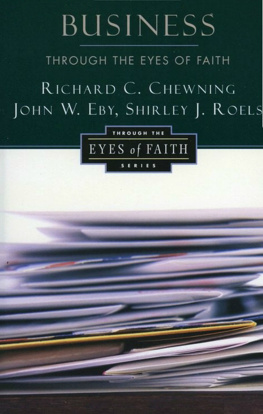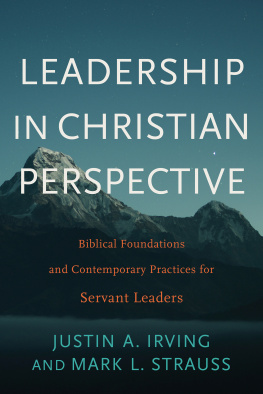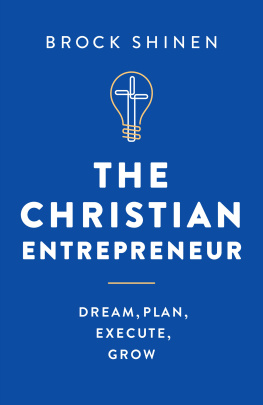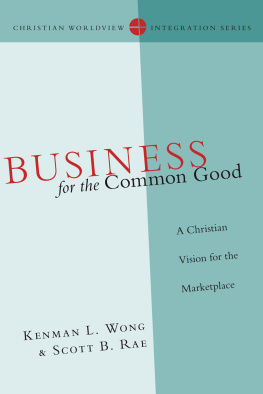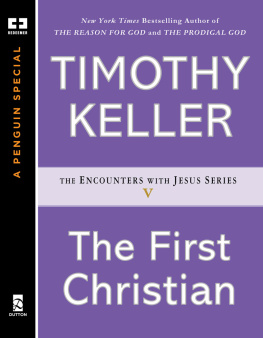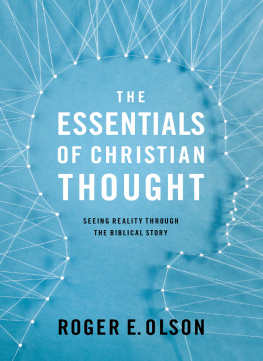
The Christian College Coalition is an association of Christian liberal arts colleges and universities across North America. More than 30 Christian denominations, committed to a variety of theological traditions and perspectives, are represented by our member colleges. The views expressed in this volume are primarily those of the author(s) and are not intended to serve as a position statement of the Coalition membership. For more information please contact the Christian College Coalition at 329 Eighth Street NE, Washington, DC 20002.
Unless otherewise noted, Scripture quotations in this publication are from the Holy Bible, New International Version. Copuright 1973, 1978, 1984 International Bible Society. Used by permission of Zondervan Bible Publishers.
Scripture quotations marked NASB are from the New American Standard Bible. Copyright The Lockman Foundation 1960, 1962, 1963, 1968, 1971, 1972, 1973, 1975.
BUSINESS THROUGH THE EYES OF FAITH . Copyright 1990 by Christian College Coalition. All rights reserved under International and Pan-American Copyright Conventions. By payment of the required fees, you have been granted the non-exclusive, non-transferable right to access and read the text of this ebook on-screen. No part of this text may be reproduced, transmitted, downloaded, decompiled, reverse engineered, or stored in or introduced into any information storage and retrieval system, in any form or by any means, whether electronic or mechanical, now known or hereafter invented, without the express written permission of HarperCollins ebooks.
Library of Congress Cataloging-in-Publication Data
Chewning, Richard C.
Business through the eyes of faith / Richard C. Chewning, John W. Eby, Shirley J. Roels. 1st ed.
p. cm.
Includes bibliographical references.
ISBN: 9780060613501
1. BusinessReligious aspectsChristianity. I. Eby, John W. (John Wilmer). II. Roels, Shirley J. III. Title.
HF5388.C54 1990
261.8dc20
8945751
08 09 10 11 12 RRD(H) 10 9 8 7 6 5 4 3 2 1
EPub Edition MAY 2013 ISBN: 9780062292155
Version 04282015
BUSINESS TASK FORCE MEMBERS
Max DePree
Herman Miller, Inc.
Stewart Lee
Geneva College
C. William Pollard
The ServiceMaster Company
Richard Schubert
former president, American Red Cross
Ron Webb
Messiah College
SERIES ADVISORY BOARD MEMBERS
Nicholas Wolterstorff
Yale Divinity School
David Benner
Redeemer College
Richard H. Bube
Stanford University
David Hubbard
Fuller Theological Seminary
Karen A. Longman
Christian College Coalition
Ann Paton
Geneva College
Timothy Smith
Johns Hopkins University
Richard Wright
Gordon College
Suppose one looks at business through the eyes of Christian faith. What does one see? What questions come to mind? Which directions seem promising? Which practices call for disapproval? Can there be such a thing as a theology of business? It is to such questions as these that this book is addressed.
Almost from the beginnings of Christianity there have been Christians who have cast an eye of suspicion on business. The authors quote the comment of St. Jerome, A merchant can seldom if ever please God. The question, then, what do faith and business have to do with each other, has long been on the agenda. To ask the question today, however, is to ask it concerning a very different kind of business from that which St. Jerome knew. Business in the modern world has become a relatively autonomous sector of society. It has a life of its own. The question is thus more complex, its answers less obvious, than it was in former ages.
The writers of this bookthemselves successful practitioners and knowledgeable teachers of businessdo not enter the discussion suspicious of business. On the contrary: they develop their understanding of business as an appropriate and even necessary part of our human calling on earth before the face of God. But neither are they apologists for business as is, or purveyors of simplistic slogans like God is not against competition or God favors individual initiative. What characterizes the discussion can perhaps best be called critical appreciation.
This critical appreciation is grounded in both an authentic spirituality and a thorough acquaintance with modern business. From this combination comes an unusually imaginative, humanly sensitive, and biblically responsive discussion of Christianity and business. Categories like justice, love, and shalom are put to work. Those who find themselves on the underside of business enter the picture as well as those who sit at the top. The impact of American business on the Third World is considered as well as its impact on America. The quality of the workplace is discussed along with the role of profits. Advertising is considered as well as production.
I have mentioned the combination of imagination and commitment in the discussion. What is also striking is what I can only call the liberated character of the discussion. To a remarkable degree, the authors have liberated themselves from ideologies of both the right and the left and looked with clear eyes of faith at this dimension of our existence, which so profoundly shapes the lives of all of usmodern business.
Naturally there are some questions, which the writers leave unanswered. There are others to which their answers may prove controversial. But whether you are a Christian or not, and whether you are engaged in business or only participate by way of consuming its products and employing its servicesif, whatever your reason, you have wanted to know how modern business looks to some perceptive and informed Christians, you will, I think, find no better book than this giving you what you want.
| Nicholas Wolterstorff |
| Professor of Philosophical Theology |
| Yale Divinity School |
God calls us as Christians to look at all of life, including business, through the eyes of faith. This means that we are called to see the world as God does. We look to biblical principles to guide our decisions and to form our values. When faced with tough questions, we ask, What would Jesus do? In difficult circumstances we examine Scripture and ask the Holy Spirit and other Christians for guidance. We want our lives to reflect wholeness and integrity.

